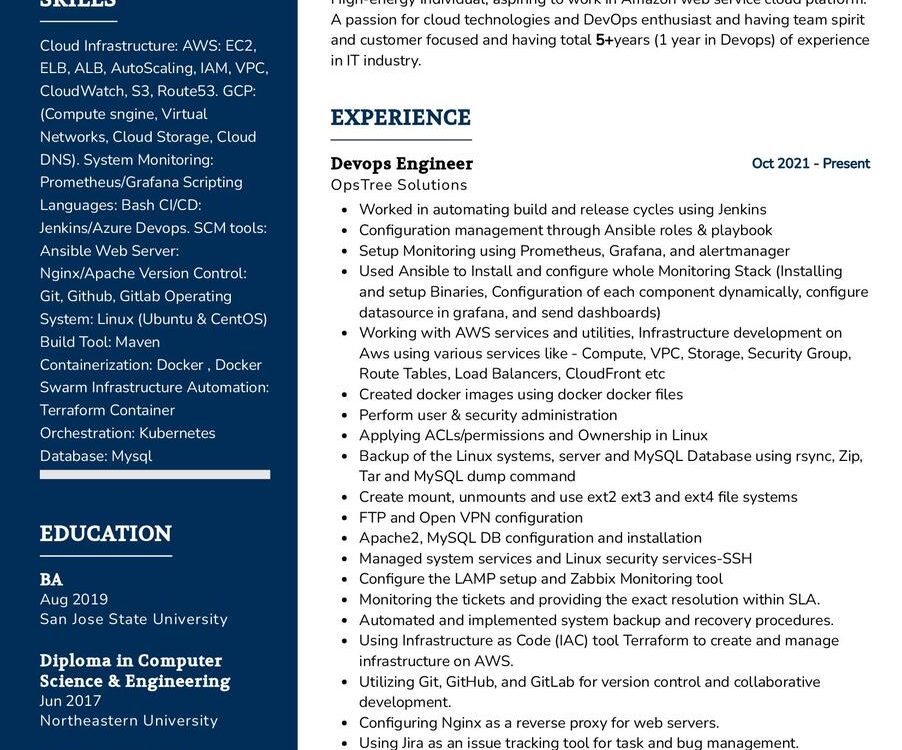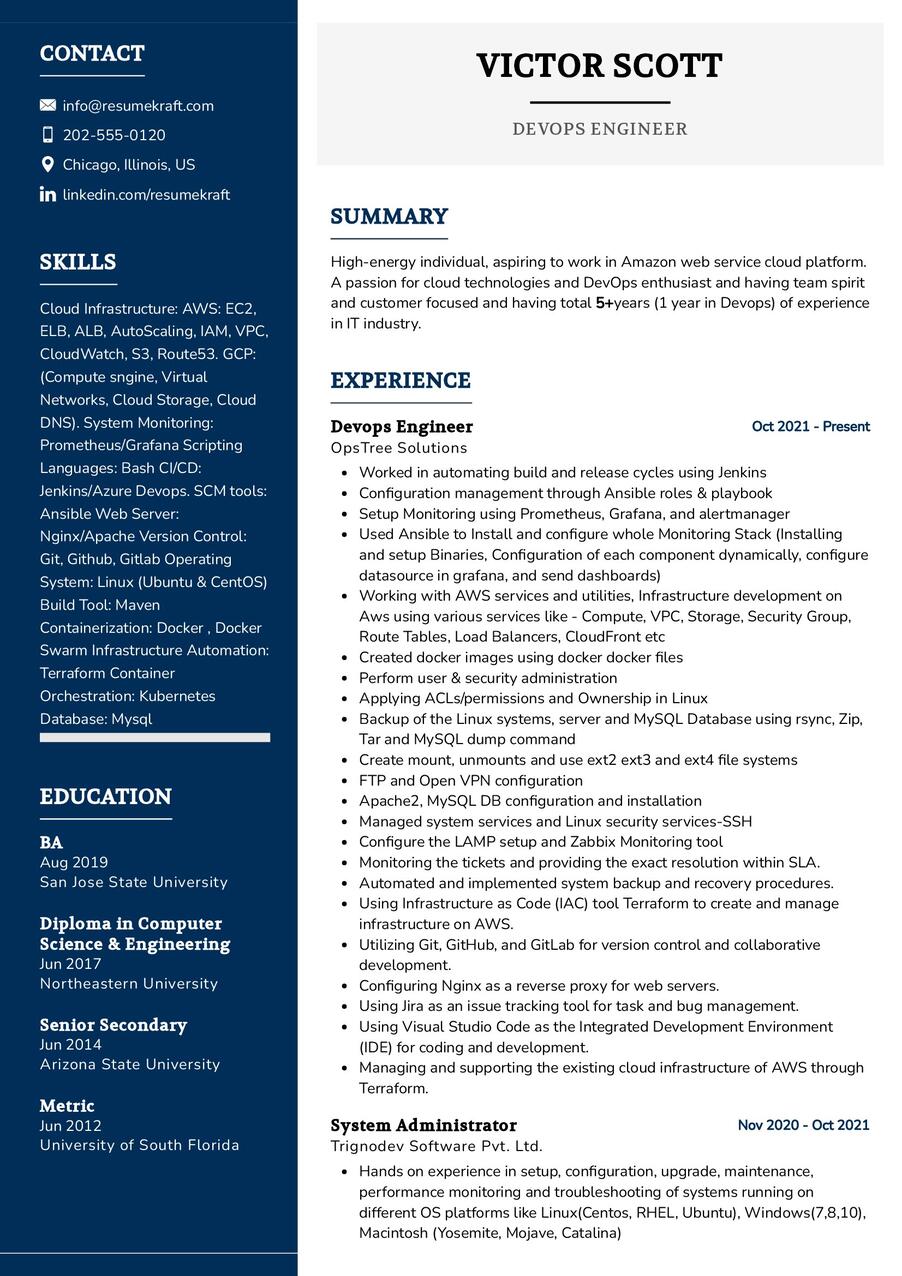Demystifying the Role of a DevOps Engineer
As the tech landscape evolves, the role of a DevOps Engineer has emerged as a linchpin in organizations worldwide. This position demands a unique blend of technical prowess and collaboration skills to optimize software development and IT operations. Let’s delve into the multifaceted responsibilities of a DevOps Engineer, exploring the skills, requirements, and key insights that define this pivotal role.
What are the DevOps Engineer Job Requirements?
Becoming a DevOps Engineer requires a diverse skill set and a commitment to continuous improvement. Here are the essential prerequisites for embracing the role:
- A Bachelor’s or Master’s degree in Computer Science, Information Technology, or a related field.
- Proficiency in scripting languages like Python, Shell, or Ruby for automation tasks.
- Experience with containerization tools such as Docker and orchestration tools like Kubernetes.
- Knowledge of infrastructure as code (IaC) principles using tools like Terraform or Ansible.
- Familiarity with version control systems like Git for efficient collaboration.
- Understanding of cloud platforms such as AWS, Azure, or Google Cloud.
- Excellent problem-solving skills and the ability to work in a collaborative team environment.
Additional certifications in DevOps practices and cloud technologies can significantly enhance your CV.
Responsibilities of a DevOps Engineer
The role of a DevOps Engineer is dynamic, requiring a combination of technical expertise and a strategic mindset. Here are the core responsibilities that define this role:
- Implementing and managing continuous integration and continuous deployment (CI/CD) pipelines to streamline software delivery.
- Automating infrastructure provisioning and configuration to achieve scalability and reliability.
- Collaborating with development and operations teams to bridge gaps and foster a culture of shared responsibility.
- Monitoring system performance and troubleshooting issues to ensure optimal application functionality.
- Implementing security best practices throughout the development and deployment processes.
- Facilitating collaboration between different teams by promoting a DevOps culture and mindset.
- Staying updated on industry trends and emerging technologies to implement innovative solutions.
Each responsibility comes with its unique challenges, offering opportunities for growth and learning.
DevOps Engineer CV Writing Tips
Crafting a compelling CV is crucial to stand out in the competitive job market. Here are tips to effectively showcase your DevOps journey:
- Highlight your experience with specific DevOps tools and technologies, emphasizing their impact on project success.
- Showcase your contributions to improving development and deployment processes, quantifying achievements where possible.
- List relevant certifications and training programs, demonstrating your commitment to staying updated in this rapidly evolving field.
- Personalize your CV for each application, aligning your skills and experiences with the specific job requirements.
Remember, your CV is your professional story—make it compelling and tailored to the DevOps role you are pursuing.
DevOps Engineer CV Summary Examples
Your CV summary is the opening act of your professional narrative. Craft a powerful snapshot of your journey with examples like:
- “DevOps Engineer with over 8 years of experience, driving CI/CD implementation that resulted in a 30% reduction in release cycles.”
- “Experienced DevOps professional skilled in automating infrastructure with Terraform, contributing to a 40% improvement in system scalability.”
- “Dedicated DevOps Engineer with expertise in Docker and Kubernetes, leading cross-functional teams to achieve seamless software delivery.”
Your CV summary sets the tone for the reader, offering a glimpse into your impact and proficiency.
Create a Robust Experience Section for Your DevOps Engineer CV
Your experience section is the heart of your CV, narrating your journey and showcasing your expertise. Here are examples to guide you:
- “Led the implementation of CI/CD pipelines, resulting in a 50% reduction in manual deployment errors and a 25% increase in team efficiency.”
- “Automated infrastructure provisioning using Ansible, improving system reliability and achieving a 30% reduction in downtime.”
- “Collaborated with development teams to integrate monitoring solutions, reducing system response time by 20%.”
Your experiences tell a story of challenges met, solutions found, and success achieved in the DevOps landscape.
Education Section for Your DevOps Engineer CV
Your educational background is the foundation of your DevOps journey. Showcase it effectively:
- Master of Science in Computer Science, XYZ University, 2015.
- Bachelor of Technology in Information Technology, ABC University, 2013.
- Certified Kubernetes Administrator (CKA), a testament to your expertise in container orchestration, 2018.
Your education section adds credibility to your skills and positions you as a well-rounded DevOps professional.
Key DevOps Engineer Skills for Your CV
Your skills are the tools in your DevOps toolbox, showcasing your abilities. Here are essential soft and hard skills for a DevOps Engineer:
Soft Skills:
- Collaboration and teamwork, essential for fostering a DevOps culture.
- Communication skills, facilitating effective interaction with diverse teams.
- Problem-solving abilities, crucial for addressing challenges in the development and deployment processes.
- Attention to detail, ensuring precision in automated tasks and configurations.
- Adaptability and resilience, key traits for navigating the dynamic DevOps landscape.
Hard Skills:
- Proficiency in scripting languages (Python, Shell, Ruby) for automation tasks.
- Experience with containerization tools (Docker) and orchestration tools (Kubernetes).
- Knowledge of infrastructure as code (Terraform, Ansible) for efficient provisioning and configuration.
- Understanding of version control systems (Git) for collaborative development.
- Familiarity with cloud platforms (AWS, Azure, Google Cloud) for scalable and reliable solutions.
Each skill is a valuable asset in ensuring success as a DevOps Engineer.
Common Mistakes to Avoid When Writing a DevOps Engineer CV
Avoid common pitfalls in CV writing to ensure yours stands out. Steer clear of these mistakes:
- Avoid using generic language; tailor your CV to showcase your unique contributions in each role.
- Focus on achievements rather than listing job duties, providing depth to your narrative.
- Don’t neglect the cover letter—it’s an opportunity to connect with potential employers and further express your interest in the role.
- Balance technical details; avoid overwhelming your CV with jargon that might obscure your true value.
- Proofread thoroughly to maintain a polished and professional image.
Avoiding these mistakes ensures your CV effectively communicates your value as a DevOps professional.
Key Takeaways for Your DevOps Engineer CV
As you conclude this comprehensive guide, keep these key points in mind when crafting your DevOps Engineer CV:
- Highlight specific DevOps tools and technologies in your experience section to demonstrate practical expertise.
- Showcase your impact by quantifying achievements, emphasizing improvements in development and deployment processes.
- Include relevant certifications and training programs, illustrating your commitment to staying updated in the dynamic DevOps field.
- Customize your CV for each application, aligning your skills and experiences with the specific job requirements.
Finally, feel free to utilize resources like AI CV Builder, CV Design, CV Samples, CV Examples, CV Skills, CV Help, CV Synonyms, and Job Responsibilities to create a standout application and prepare for the DevOps Engineer job interview.
Armed with these insights and tips, you are now ready to craft a CV that is a true reflection of your journey, your skills, and your aspirations. Remember, your CV is not just a document; it is a canvas where you paint your career story, a story of growth, learning, and successful DevOps leadership. Best of luck!


